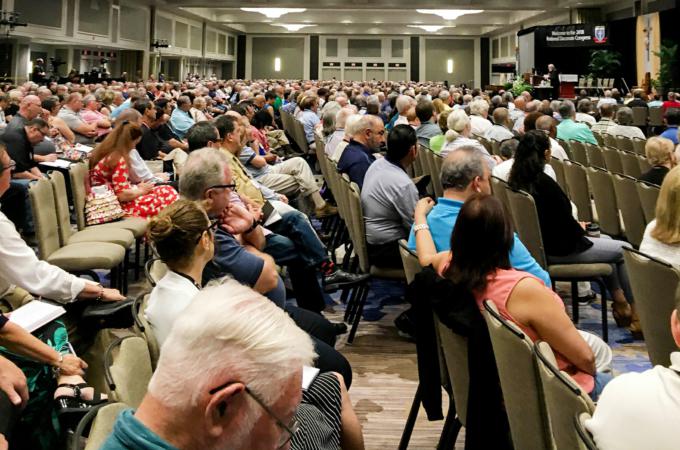What happens in the Church can't stay in the Church
They say, "What happens in Vegas stays in Vegas." Although I have never been to "The Entertainment Capital of the World," I just returned from "The Big Easy." I was in New Orleans for a National Congress to celebrate the 50th Jubilee of the restoration of the diaconate as a permanent order within the life of the Church. There, nearly 3,000 deacons and their wives prayed the Liturgy of Hours and the Eucharist, listened to keynote addresses from cardinals, bishops, and other deacons, and shared fellowship. As I participated in this historic gathering, it became very clear to me that what was happening in the community gathered in New Orleans could not stay inside the walls of their meeting space. As inspiring as all the conferences and workshops were, what moved my heart the most was the silent cries of the homeless that I encountered for five days up and down the streets of the French Quarter.
Every morning while in New Orleans, I took a walk down Decatur Street which parallels the Mississippi River. Within two blocks, I encountered a homeless woman sleeping on the sidewalk with her small dog nestled in behind her. A few blocks up the road was another man, sleeping in a fetal position. What caught my attention was the metal halo around his head supporting screws that kept his head and neck from slipping out of alignment. Nearby on the other side of the road was a woman, no older than 30, blankly gazing ahead holding a sign that read, "Homeless and Hungry." In the five days I was there she never looked up or down, nor did she speak a word. Two feet to her right was a man who asked me for a dollar, a dollar I didn't have on my person. I replied to him, "I don't have any money, but I'll catch you on my way back." I kept my word giving him a few dollars and a muffuletta sandwich from Central Grocery. Grateful, he replied, "You remembered, God bless you."
There was a stark contrast between my experiences in the Grand Ball Room listening to the invited speakers and on the streets listening to the cries of the poor. In the ball room I was inspired and animated to make a difference. But on the streets of New Orleans I felt powerless. Mindful that my sense of powerlessness paled in comparison to the helplessness that the hungry men and women sleeping on the streets feel every day, I am left wondering: Where and how does my sense of powerless meet theirs?
The witness of the Gospel reveals that this meeting place is the diakonia of Jesus Christ. This diakonia continues whenever we allow our hearts to be wounded by the suffering others endure. By going to and staying with those whom others easily push to the alleys, we can reveal a God who listens, remembers, and serves.
Many times during the Diaconate Congress, the question, "Do we need deacons?" was explored. In short, the answer is a resounding "YES." But we don't need deacons to create another barrier between cleric and laity. We need deacons because of who they make present in their ministry. The deacon, by sacramental ordination, makes present the ministry of Christ and his Church. By his presence around the altar, the deacon is a permanent reminder of who the Church is called to be outside of the church building and in the streets -- ministers of tender mercy. But there is another "presence" the deacon makes visible around the altar -- he makes present the poor woman and her dog. He makes present the man curled up resting on the metal frame stabilizing his head. He makes present the woman who is homeless and hungry. Does the deacon, does the Church, and do we, as baptized believers, make present the homeless man who in gratitude says to us, "You remembered. God bless you"?
As I reflected on the powerlessness I felt in ministering to each person I encountered on the street last week, I was gifted with a brief flash of insight, "What happens in the Church cannot stay inside the church building." From a hungry world we are called, and to a hungry world we are sent to minister God's tender mercy. We are not meant to minister alone. We are the Church and we are called to minister to our wounded sisters and brothers. What we can't do alone, we can do together.
DEACON CHRISTOPHER CONNELLY IS ASSIGNED AS DEACON TO THE TRI-PARISH BROCKTON COLLABORATIVE AND DIRECTOR OF FORMATION FOR THE PERMANENT DIACONATE. THIS REFLECTION IS ONE IN A SERIES ACKNOWLEDGING THE 50TH ANNIVERSARY OF THE RESTORATION OF THE PERMANENT DIACONATE IN THE UNITED STATES AND EXPLORING THE UNIVERSAL CALL TO DIAKONIA FOR THE CHURCH AND ALL DISCIPLES.



















